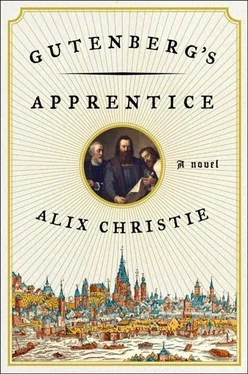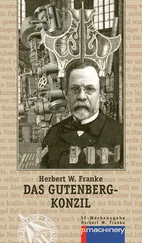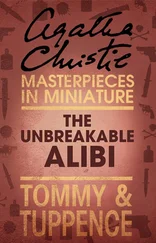“The book is done! It’s selling! What more in God’s name would you have me do?” Gutenberg looked stunned. He truly could not see why he should stand accused. And none of it did matter — all of it was dust and ash, thought Peter, trials that they’d surmounted in the wilderness they’d crossed.
They’d made it! They had reached the final page, the Promised Land. The Revelation! — or else the Apocalypse. A band of metal cinched his chest. Peter stepped toward his father, his fists clenched. “What do you mean? That you withdraw? That you can’t wait, and have no faith in any of us, the whole workshop?” He saw his psalter type abandoned on the stone.
The master made a little sound, a kind of exhalation, which Fust took as another Elder sneer. He wheeled on Gutenberg. “You’ve never been a partner in the true sense of the word. You ran your piece on your own terms, and hid the truth and your own follies. You must think me a fool, to accept all these years — and still more years ahead — you making hay while I am beggared.”
Fust’s face went blank then as he turned his gaze on Peter. “You even took my son,” he said. He shrugged, as if to show that he would not be wounded. “It has occurred to me that this must be your purpose: to pay me off this pittance of a profit, then cut me out and carry on with Peter.”
Jakob stirred, and Peter saw that look of hatred and disdain — that poison that seeped out of Mainz to blight all life. “How you can even think of such a thing,” Peter muttered.
“You wouldn’t—” flew from Gutenberg.
“This partnership, as far as I’m concerned, is ended. I will instruct the court that you have used my funds to your own private profit. What’s more—”
The master didn’t even let him finish. “Calumny!” he roared. “Vile, underhanded slander!”
“The books don’t lie.” His uncle rose, and Peter understood his role: both judge and witness to the slaughter. “You skimmed it off, to fatten your own purse. Johann’s too kind to call it what it is: pure simple theft, embezzlement.”
“Embezzlement!” The master hacked a laugh. “Who is the thief here, stealing what he hasn’t got the brains to grasp? This was no partnership — in this, at least, you’re right.” He stabbed a finger toward Fust. “What did you bring to it? Not wit nor toil but only lucre. A merchant’s gold, and niggardly at that, while all the art and craft of it was mine alone.”
They stood face-to-face, chests heaving, spewing hate, and Peter’s whole life shrank into the sliver of air between them.
Fust shrugged. “You owe me interest on the first loan, too. Four hundred total for these past four years.”
“You dare to lie and smear my name.” Gutenberg was feral then, his wild hair flying. “When all along you only fed upon me like a vulture. This was no partnership, no true and equal meeting of the minds. This work was mine — from start to finish.” His maddened eyes fell then on Peter.
“Don’t stand there — tell him! You know the truth. There was no interest due — he forced me into training you. And now you think”—he whirled back to face Fust—“that you can simply pluck him up, and put him back to work to your advantage.”
Peter was a tool, a little clinking sack, that in their fury they just tossed between them.
“That’s quite enough,” his father said.
The workshop, sacked. The presses, ores, the punches, men. The brotherhood, the priesthood they had been.
But Gutenberg was not done yet. He’d have the last word, always. “Think on the Revelation, Johann,” he said bitingly. “And all you merchants of the harlot in the time to come.”
“Good God!” said Jakob, springing to his feet.
“I spit upon your gold — it has no worth compared to all the wit that God has given me to rise above you grocers. Cast dust upon your head. I’ve come too far by my own hands against you fools who set yourselves against me.” Gutenberg snatched up his cloak. “I did it all alone and owe you nothing, you who’d rip it from me, shame your soul. I need you not, I never needed you. I need no man.”
There was a rip then in the fabric of the world, and a faint ringing. Peter heard the door slam as the master left, leaving him — Gutenberg’s apprentice, then his journeyman and foreman, finally his equal — staring mutely after him.
He’d done it all himself. He needed no man.
The work of letters and the tracery of ligature, the beauty of a well-proportioned line, were nothing to a man like that. He cared for nothing, no one, but his pride. A part of Gutenberg was cauterized inside. In that moment Peter understood that there would always be some moneyman to pump, new jobs to beg, new Elders, merchants, nobles, to connive. He stooped and picked up his own cloak.
Fust made a move toward him, but Peter stopped him with his hand. Oh ye of little faith . In Jakob’s eyes he saw that smoldering resentment that turned everything it touched to rubble. He heard the harsh tongues of archangels as they poured their vials of poison from the sky: For in one hour are such great riches come to nought.
CHAPTER 4: SPONHEIM ABBEY
March 1486
SPRING IS COILED and waiting to arrive. There is a scoured feeling of expectancy in the dark earth underneath the abbot’s windows. Peter gazes through the rippled glass. Memory is like this, with its lumps and thin spots and distortions, he thinks to himself. Trithemius waits patiently; for once he does not prod.
“It ended just like that?” eventually he asks.
“It takes some time to wind a business down,” says Peter, turning back. “But yes, that’s when it ended.”
Fust filed his lawsuit six months later, after Lenten Fair. Each partner had been ordered to appear and swear the truth of his accounts. “But truth was never Gutenberg’s strong suit.”
The reed keeps scratching, but the abbot makes no answer.
“My father claimed that he was owed two thousand with the interest, which was not exactly truthful either. The master couldn’t pay — or wouldn’t.”
He could have paid it if he wanted to, with the income from the Bible and indulgences, Peter still believes. “But he did not contest it. He did not even turn up for the swearing. He simply walked away.”
Trithemius lifts his head and searches Peter’s face. “I see.”
“And so the shop was split. He went his way, and we went ours. Each got some type and some equipment.”
“Why didn’t he contest it, do you think?”
“He knew who was to blame. I think he didn’t want to show his books. But more than that, he knew my father had every reason to feel betrayed.”
“As you too have felt all these years,” the abbot says.
“Where there’s no trust, there can be no partnership.”
“There was no trust on Fust’s side, either.”
“That’s true. He could not see — nor I — that we could keep on working on such terms.” A wave of sadness pushes at the printer’s chest. “Though it was hard for me, of course.”
He has gone on to build an empire. The master left two Bibles and some grammars and some letters of indulgence and the type for an encyclopedia. He died without a son to burnish his own name. Of course, right to the end he’d thought that Peter was the one who’d carry on his flame.
“Each of you followed your own conscience,” says the abbot gravely.
“You still defend him then.”
Trithemius puts down his pen. His face is thoughtful. “You yourself know how it is to deal with power,” he says slowly. “You’ve said yourself it takes a certain… flexibility to get things done.”
Peter nods. He knows the corridors of power, just as Gutenberg did once. A phrase floats up into his mind, a thing the master said before they’d even started on their Bible. I know the ways of the Holy See, to my misfortune.
Читать дальше












